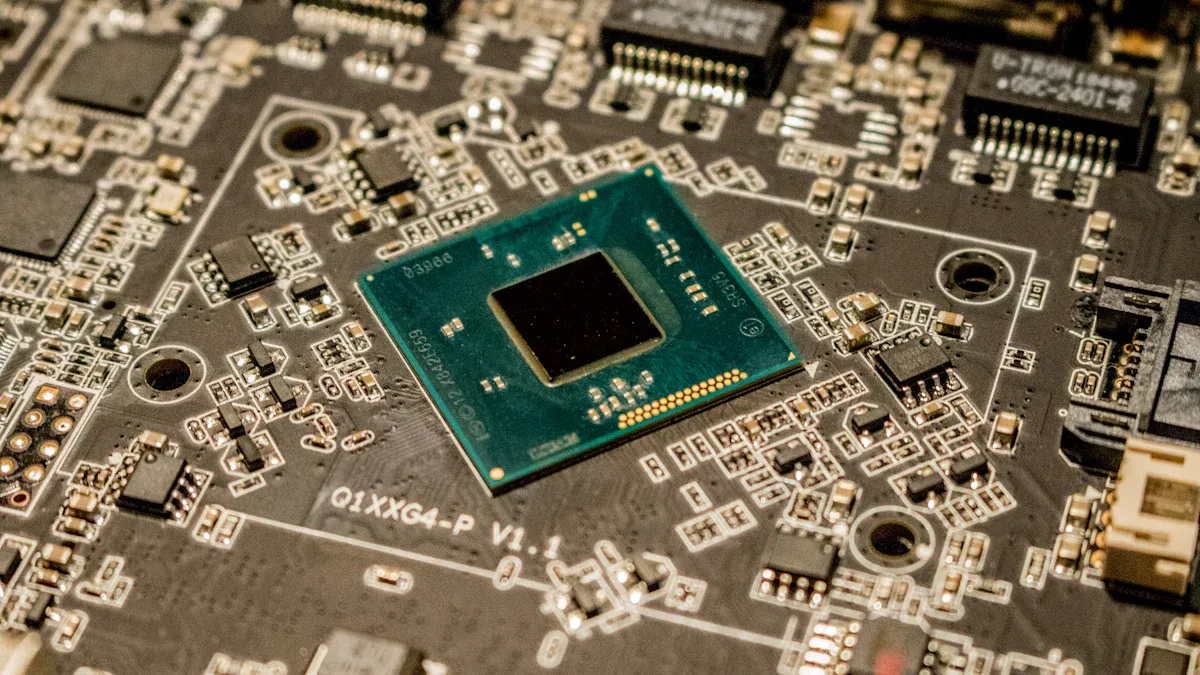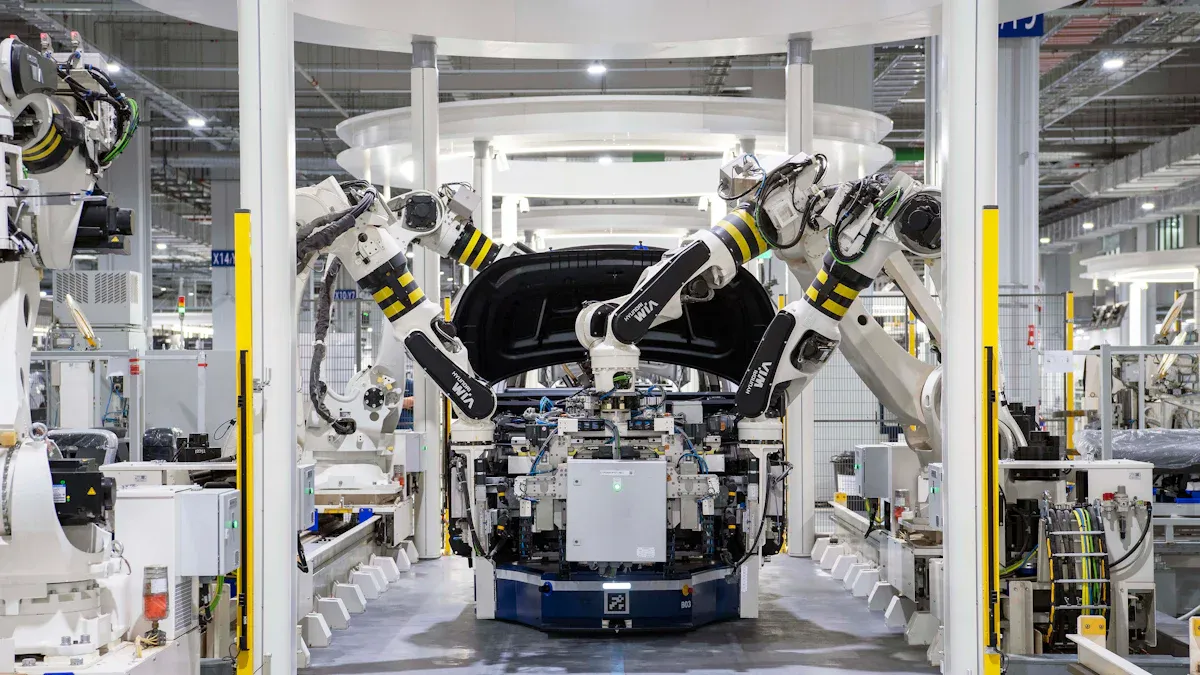
Choosing the right PCBA professional manufacturer impacts your product’s quality. A good PCBA professional manufacturer uses top parts and smart methods. Careful steps like solder paste printing make things accurate. Automated checks also help catch mistakes early. Tests like functional and in-circuit testing ensure it works well. Makers following rules like IPC-A-610 meet high-quality standards. Working with skilled PCBA professional manufacturers improves how your product works and lasts.
Key Takeaways
Pick manufacturers with well-known certifications like ISO 9001 and IPC-A-610. These ensure good quality and trust.
Find manufacturers using modern testing to spot errors early. This helps make products more reliable.
Check if the manufacturer has experience in your industry. This ensures they can handle your specific needs.
Think about long-term benefits, not just saving money now. This avoids expensive problems later.
Choose manufacturers who communicate clearly and offer good support. This makes production easier and smoother.
Ensuring Quality and Reliability

Certifications to Look For
Certifications are important for making reliable and quality PCBs. Pick manufacturers with well-known certifications. For instance, ISO 9001 shows they follow strict rules and improve often. In healthcare, ISO 13485 ensures safety and high standards. For aerospace, AS 9100 is key because reliability is crucial.
Certification Type | Focus Area | Number of Certifications | Requirements |
|---|---|---|---|
ISO 9001 | General | Over 1.1 million | Two-step audit, reviewed every three years |
ISO 13485 | Medical | N/A | Two-step check, inspected every 6-12 months |
AS 9100 | Aerospace | N/A | Three-step audit, reviewed every three years |
ISO/TS 16949 | Automotive | 30% of auto manufacturers | Two-step audit, reviewed every three years |
These certifications prove the manufacturer meets industry rules. This helps make quality PCBs that fit your project. Picking a certified manufacturer lowers defects and boosts PCB reliability.
Quality Control and Testing Processes
Good quality control stops mistakes in production. Top PCB makers use advanced tests to meet strict rules. For example, solder paste inspection (SPI) and automated optical inspection (AOI) find problems early. X-ray checks soldering, and functional testing (FCT) ensures the PCB works right.
Testing Process | Description |
|---|---|
Initial inspection | Checks parts are correct before assembly. |
Soldering quality control | Uses tools like X-rays to check soldering. |
Electrical testing | Tests connections and resistance for proper working. |
Makes sure the PCB works as designed. | |
Environmental testing | Tests how it works in different conditions. |
High temperature aging test | Finds heat-related issues by simulating long use. |
Signal Integrity Analysis | Checks how well signals move through the PCB. |
Traceability and documentation | Tracks production history and test results. |
In one example, faulty heating was caught during soldering checks. Fixing it improved the number of good PCBs made. These steps make products more reliable and reduce failures.
Importance of Industry Standards
Following industry rules is a must for quality and reliability. Standards like IPC-A-610 set rules for soldering and assembly. Manufacturers who follow these rules make better PCBs that customers trust.
Research shows using these rules improves reliability a lot. For example, failure rates dropped by 65% after using them. Test station success went up by 12.64%, and complaints dropped by 70%.
Improvement Metric | Before Implementation | After Implementation | Improvement (%) |
|---|---|---|---|
Field failure rates | N/A | 35% | 65% |
Yield at test stations | 87% | 98% | 12.64% |
Customer complaints related to reliability | N/A | 30% | 70% |
Choosing a manufacturer who follows these rules ensures durable PCBs. This makes your product last longer and saves money on repairs.
Evaluating Expertise and Experience
Technical Knowledge and Advanced Capabilities
When picking a PCB maker, check their skills and tools. A good manufacturer uses modern technology and trained workers. They make processes simple to save time and avoid mistakes. This improves how well the PCB is made.
Key signs of strong technical skills include:
Using advanced tools for accurate production.
Employing experts in PCB assembly.
Simplifying steps to cut waste and work faster.
Managing materials to keep quality steady.
Using lean methods to save money and deliver quickly.
Manufacturers with low error rates and high success on first tries show quality. Delivering on time and handling design changes well proves they are reliable. Picking such a manufacturer ensures your PCB is top-notch.
Specialization in Specific Industries
Not all PCB makers work in every field. Some focus on areas like aerospace, cars, or healthcare. This focus helps them meet special needs for each industry. For example, medical device makers follow strict rules for safety. Car-focused makers ensure parts are tough and dependable.
Ask about the industries a manufacturer serves. A focused maker knows your field’s challenges and offers smart solutions. This ensures your PCB works perfectly for its job.
Track Record of Successful Projects
A manufacturer’s past work shows their skill and trustworthiness. Looking at old projects helps you see what they can do. For example, success in energy systems or embedded designs shows they handle tough tasks well.
Here are some examples of their work:
Case Study Title | Description |
|---|---|
Imaging System with Embedded Tech | Built an imaging system using advanced embedded tools. |
Embedded AC/DC Power Supply Design | Created a power supply with embedded features. |
Multi-Processor Rail Controller | Designed a rail controller using multiple processors. |
Energy Storage Monitoring | Made monitoring tools for large energy storage systems. |
These examples show the maker’s ability to solve problems in many fields. Choosing a proven manufacturer lowers risks and boosts project success chances.
Balancing Cost and Value
Clear Pricing
Knowing how prices are set helps avoid surprises. Clear pricing shows what you pay for, like materials and testing. For example, JLCPCB is known for fair pricing with no hidden fees. This helps you plan your budget better.
Many things affect PCB costs. Board size, layers, and materials matter a lot. Bigger boards need more materials and time, raising costs. Special materials, like heat-resistant ones, also cost more. By choosing wisely, you can save money without losing quality.
Factor | How It Affects Cost | Tips to Save Money |
|---|---|---|
Board Size | Bigger boards use more materials and time. | Make boards smaller to save materials. |
Layer Count | More layers need extra work. | Use only the layers you really need. |
Material | Special materials cost more. | Pick standard materials when they work well. |
Picking a manufacturer with clear pricing avoids surprises. It also helps you plan your project costs better.
Long-Term Value vs. Short-Term Savings
Choosing the cheapest manufacturer can cost more later. Saving money now might lead to delays or bad quality. These problems can make your project more expensive and hurt its success.
Big costs in PCB assembly include parts, board making, and tools. Parts alone can be over 95% of the total cost. Picking good parts and smart processes saves money and gives better value.
Focusing on long-term value makes your product more reliable. It also lowers the chance of costly fixes or delays.
Avoiding Extra Costs
Hidden costs can mess up your budget and delay work. To stop this, choose a manufacturer that explains all costs clearly. Good manufacturers include things like testing and meeting rules in their prices.
Factor | What It Means |
|---|---|
Production Method | Skilled workers and setup can raise costs. |
Testing and Quality Control | Extra checks cost more but make products better. |
Compliance Requirement | Following rules costs more but ensures safety and quality. |
Smart cost-saving ideas, like managing materials well, help avoid extra costs. Working with an honest and skilled manufacturer saves money without losing quality or options.
Importance of Lead Time and Delivery
On-Time Delivery and Flexibility
Getting your PCB on time is very important. A good PCB maker delivers boards when promised. This helps you meet deadlines and avoid problems. Flexible delivery schedules are also helpful. They let you handle changes without losing quality.
Reliable manufacturers often show great results, like:
Raising on-time delivery rates from 85% to 97%.
Improving customer satisfaction by 25%.
Lowering production costs by 15%.
These benefits show why choosing a dependable manufacturer matters for your project.
Supply Chain Management
Good supply chain management keeps parts flowing smoothly. Skilled manufacturers work with trusted suppliers for quality and timely materials. This lowers the chance of delays or bad products.
Important supply chain metrics include:
Metric | What It Means |
|---|---|
Supplier Reliability | Suppliers deliver on time and meet quality rules. |
Lead Time Consistency | Parts arrive when expected without delays. |
Quality Standards | Components meet all needed rules and specs. |
Responsiveness | Suppliers quickly fix problems or answer questions. |
Focusing on these areas improves quality and tracks issues better. This ensures your PCB meets high standards.
Handling Tight Deadlines
Tight deadlines need smart planning by manufacturers. They must adjust quickly to deliver your PCB on time. Top manufacturers use these methods for urgent orders:
Strategy | What It Does |
|---|---|
Proactive Capacity Planning | Adds production space to handle more orders. |
Streamlined Order Processing | Speeds up order steps and reduces mistakes. |
Flexible Manufacturing Strategies | Changes processes to fit new needs fast. |
Expedited Supply Chain Management | Moves parts faster by working closely with suppliers. |
Proactive Customer Communication | Updates you about your order to avoid surprises. |
These steps help keep your project on schedule, even with tight timelines. Picking a manufacturer with these skills reduces risks and keeps things running smoothly.
Customer Support and Communication
Quick Responses and Easy Access
Good customer support means fast replies to your questions. A trustworthy PCB maker answers quickly and solves problems right away. Look for manufacturers who are easy to contact. They should offer options like email, phone, or live chat. This makes sure you can reach them anytime you need help.
Great customer support often shows in these areas:
Customer Satisfaction Score shows how happy clients are with service.
Feedback helps manufacturers fix issues and improve their work.
When a manufacturer is easy to reach, it builds trust. This also makes working together on your project much smoother.
Simple and Honest Communication
Clear communication helps fix problems during PCB production. A good manufacturer keeps you updated at every step, from start to finish. Sharing honest updates avoids confusion and keeps your project on track.
In the supply chain, clear updates solve production problems faster. Without honesty, delays happen, and trust can be lost. Picking a manufacturer who values open communication avoids these issues. It also helps your project run better and faster.
Help After Delivery
Your connection with a PCB maker doesn’t stop after delivery. Post-delivery help is important for fixing any problems later. A reliable manufacturer helps with repairs, replacements, or troubleshooting. They also give clear instructions to help you understand the product.
Good post-delivery support makes sure your PCB works well. It reduces downtime and makes your product more reliable. When a manufacturer focuses on solving problems, it shows they care about your success.
Reputation of the PCB Manufacturer
Checking Reviews and Feedback
Before picking a PCB maker, check their reviews and reputation. Customer feedback shows how good their services are. Look for reviews on their website or trusted review sites. These reviews often mention things like fast delivery, good quality, and helpful support.
Notice patterns in the reviews. If many people praise their quick work or skill in certain industries, that’s a good sign. But if there are repeated complaints about delays or bad communication, be cautious. Reading reviews helps you choose wisely and avoid problems later.
Looking at Industry Experience
How long a PCB maker has been in business matters. Companies with years of experience are usually more reliable. They’ve likely handled market changes and built trust over time. Long-lasting companies often deliver steady quality and keep customers happy.
Experienced makers also use advanced tests to ensure strong products. For example, burn-in testing finds early failures, and HALT testing checks how products handle tough conditions. The table below explains some common tests:
Test Type | What It Does |
|---|---|
Burn-in testing | Finds weak parts that might fail early. |
Highly accelerated life testing (HALT) | Pushes products to their limits to test durability. |
Highly accelerated stress testing (HAST) | Similar to HALT but focuses on design weaknesses. |
Highly accelerated stress screening (HASS) | Tests products after HALT but with less stress. |
These tests show the manufacturer’s focus on making reliable PCBs that last.
Learning from Case Studies
Case studies show real examples of what a PCB maker can do. They explain how the company solved problems and made great PCBs for different industries. For example, a case study might show how they built a strong PCB for a medical device or a high-tech board for aerospace.
When reading case studies, look at the results. Did they meet the client’s needs? Were they on time and within budget? These stories prove their skills and build trust in their ability to handle your project.
Environmental Responsibility in PCBA Manufacturing

Sustainable Practices and Eco-Friendly Materials
Sustainability is important in making PCBs today. Look for manufacturers using eco-friendly methods to protect the environment. Many now recycle materials and use low-emission processes. These steps save resources and reduce waste. For example, additive manufacturing cuts down on water use and waste during production.
Here are key ways to measure sustainability:
Metric | What It Tracks |
|---|---|
Carbon Footprint | Total greenhouse gases made by the factory. |
Energy Intensity | Energy used for each product made. |
Waste Diversion Rate | How much waste is recycled or reused instead of thrown away. |
Water Usage | Amount of water used and saved during production. |
Choosing a manufacturer focused on these areas helps the planet and ensures quality PCBs.
Compliance with Environmental Standards
Following environmental rules keeps PCBs safe and legal worldwide. Top manufacturers follow strict rules like RoHS and REACH. RoHS limits harmful materials like lead, while REACH checks the safety of chemicals used.
Manufacturers show they follow these rules by:
Listing all materials and chemicals used.
Providing certificates proving they meet RoHS standards.
Sharing lab test results showing safe material levels.
Marking products to show compliance.
Tracking materials through the supply chain.
These actions ensure safe PCBs and show the manufacturer cares about the environment.
Reducing Environmental Impact
Lowering environmental harm needs smart planning. Manufacturers can use energy-saving tools and better processes to cut emissions. Recycling materials also reduces waste. Using renewable energy in factories lowers the carbon footprint even more.
For example, some manufacturers save energy by improving supply chains. Others use water-saving methods, cutting water use by 30%. These changes help the environment and make production more efficient.
By picking a manufacturer focused on reducing harm, you support sustainability and get reliable PCBs.
Picking the right PCB maker helps your product work well. Good makers follow rules, use modern tools, and care for the environment. For instance, smart practices can cut harmful chemicals in water, showing how green methods help.
Think about long-term benefits, not just saving money now. Research carefully to find a maker that fits your project. This way, your circuit board works great and meets your goals.
FAQ
1. What matters most when picking a PCB manufacturer?
Focus on quality and trust. Check for certifications like ISO 9001 and IPC-A-610. These show the manufacturer follows strict rules. Reliable makers also use advanced tests to create top-quality circuit boards.
2. How can I make sure my PCB arrives on time?
Pick a manufacturer known for delivering on schedule. Ask about their lead times and how they manage supplies. Good manufacturers also offer flexible delivery plans to meet your needs.
3. Why are certifications important for PCB makers?
Certifications show the manufacturer meets industry rules. They ensure the PCB is safe, reliable, and follows regulations. For example, ISO 13485 is key for medical devices, and AS 9100 is vital for aerospace.
4. How do I avoid surprise costs in PCB making?
Request a detailed price list from the manufacturer. Make sure the quote includes testing, compliance, and other services. Clear pricing helps you budget and avoids unexpected charges.
5. Which industries need specialized PCB manufacturers the most?
Industries like aerospace, cars, and healthcare need special PCBs. Experts in these fields know the challenges and provide custom solutions. This ensures your PCB works well and meets safety standards.
See Also
Essential Advice for Selecting a PCBA Contract Manufacturer
Crucial Insights for Picking a Trustworthy PCBA Manufacturer
Important Aspects to Evaluate When Selecting a Custom PCBA